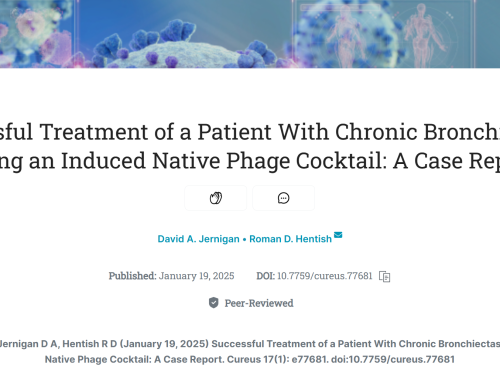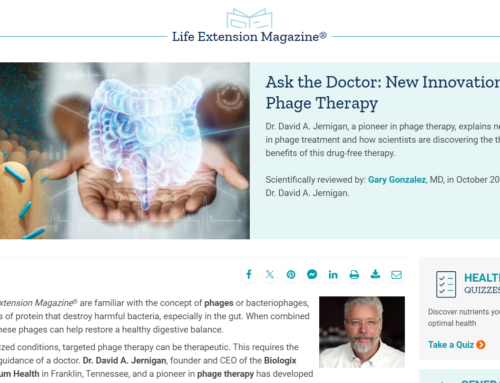Chronic illnesses are complex, often involving multiple pathogens that activate simultaneously and lead to persistent, treatment-resistant conditions. This phenomenon is known as Multi-microbial Activation Syndrome (MMAS), a term coined to capture the multi-faceted nature of these illnesses. Conventional treatments, including antibiotics and antifungals, are often ineffective over the long term and can disrupt the body’s natural balance. Enter Induced Native Phage Therapy (INPT)—an innovative approach that has evolved from its initial focus on treating Borrelia bacteria to addressing a broad range of pathogens through induced native phage cocktails.
What Is Multi-Microbial Activation Syndrome (MMAS)?
MMAS refers to a state in which multiple latent microbes in the body become active and virulent at the same time. Unlike past approaches that focused on single-pathogen infections, MMAS recognizes that chronic illnesses often stem from complex interactions between various microbial populations. These multi-pathogen conditions challenge conventional treatment methods, which typically rely on broad-spectrum drugs that can inadvertently damage the beneficial microbiome and further compromise health.
The Evolution of Induced Native Phage Therapy (INPT)
Induced Native Phage Therapy was initially recognized for its effectiveness in targeting Borrelia bacteria, commonly associated with Lyme disease and similar conditions. However, the therapy has expanded far beyond its roots. INPT now harnesses the power of the human body’s natural viral populations, known as phages, to combat a wide array of pathogens involved in MMAS. The proprietary technology known as Biospectral Emission Sequencing (BES) is used to stimulate native phages, activating them to target specific microbes without disrupting the body’s natural ecosystem.
Introducing Induced Native Phage Cocktails
The development of induced native phage cocktails marks a significant milestone in the evolution of INPT. These cocktails contain multiple electromagnetic signatures, each designed to activate specific native phages to combat different pathogens. This targeted approach allows for precision treatment, addressing various infections simultaneously without harming beneficial bacteria.
Advantages of INPT Cocktails:
- Safety and Efficacy: Over 100,000 doses have been administered with no reported adverse effects, demonstrating a strong safety profile.
- Precision Targeting: Unlike conventional antibiotics that wipe out both harmful and beneficial microbes, INPT selectively targets only the pathogenic microbes, preserving the body’s microbiome.
- Minimal Immune System Involvement: INPT works in harmony with the body’s natural systems, reducing pathogenic microbes without triggering severe immune responses or complications.
Clinical Evidence and Results
Clinical studies have shown compelling results with the use of INPT. Up to 92% of participants tested negative for the targeted pathogens after treatment, with many reporting significant improvements in symptoms and long-term relief. Unlike conventional treatments that can trigger Jarisch-Herxheimer reactions due to rapid microbial die-off, INPT minimizes these reactions by using a controlled, gentle approach to microbial elimination.
Why INPT Is Different
Induced Native Phage Therapy stands apart from Conventional Phage Therapy (CPT) and other treatment methods. While CPT relies on introducing foreign or genetically modified phages into the body, INPT leverages the native phages already present within the human system. These phages are activated through BES technology, aligning with the body’s natural bioregulatory mechanisms to combat specific pathogens effectively and safely.
Key Benefits of INPT:
- Non-Disruptive to the Microbiome: INPT’s targeted approach preserves the beneficial bacteria in the body, maintaining the balance essential for good health.
- Broad Application: Induced native phage cocktails can be customized to target over 100 different types of infections, making INPT a versatile solution for complex illnesses.
- Biofilm Penetration: INPT has been shown to dissolve biofilms that can shield pathogens, ensuring thorough treatment and recovery.
Real-World Applications:
Induced native phage cocktails have proven effective against various pathogens linked to chronic respiratory infections, Lyme disease, and other MMAS-related conditions. The therapy also targets microbial toxins like endotoxins and lipopolysaccharides (LPS), which can exacerbate symptoms. This comprehensive approach enhances the body’s ability to heal and recover without the adverse effects commonly associated with conventional treatments.
Conclusion
The development of Induced Native Phage Cocktails has expanded the scope and potential of Induced Native Phage Therapy, making it a revolutionary treatment option for Multi-microbial Activation Syndrome and other chronic, treatment-resistant conditions. Unlike conventional therapies, INPT aligns with the body’s natural functions, offering a safer, more effective alternative that preserves overall health and wellness.
Interested in learning more about how INPT could be the answer for treatment-resistant illnesses? Read the full article here or contact Biologix Center for a personalized consultation.




